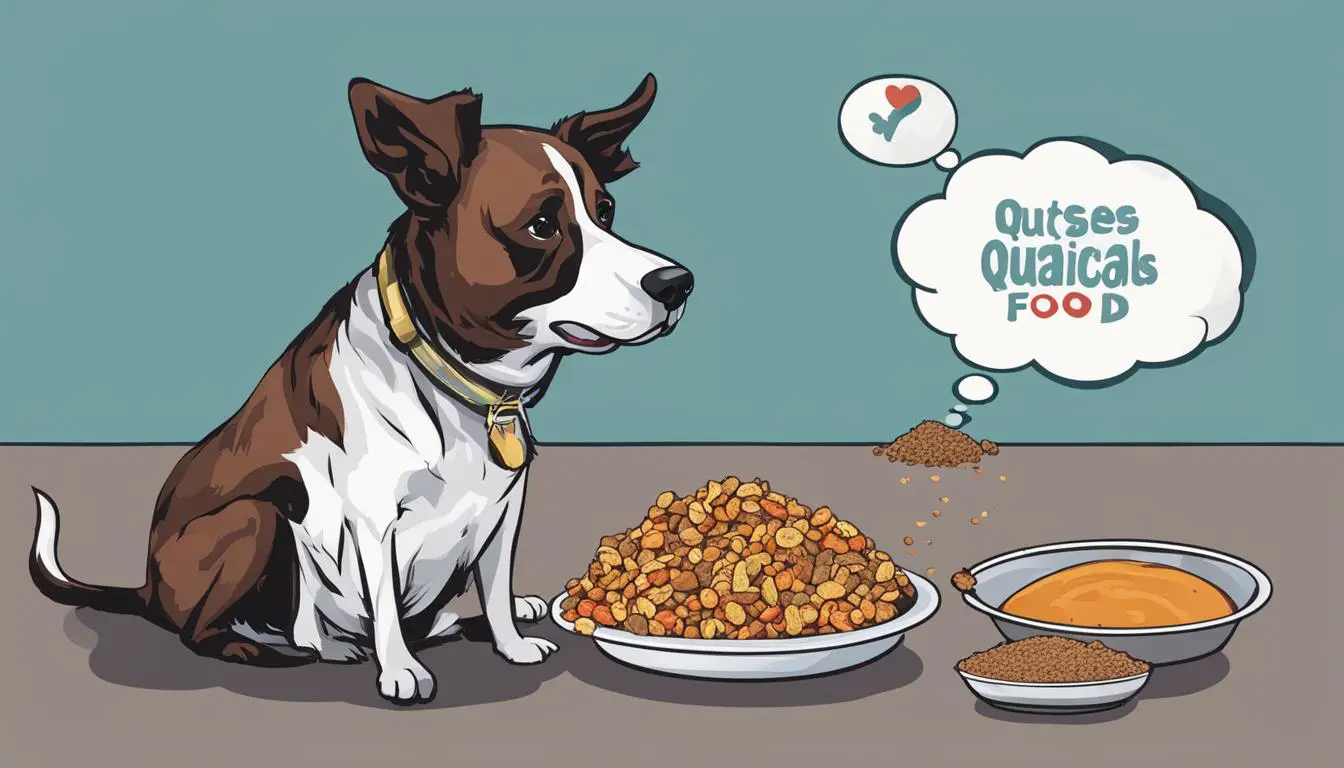Why Your Dog is Always So Hungry: Causes and Solutions
If your dog is constantly begging for food and displaying a never-ending appetite, it’s essential to understand the underlying causes and find effective solutions.
There are several reasons why dogs may always be hungry, including genetics, exercise levels, health issues, medication side effects, stress, boredom, and dietary factors.
Genetic factors can play a role in a dog’s insatiable hunger. Certain breeds, such as Labrador Retrievers, Cavalier King Charles Spaniels, Cocker Spaniels, Beagles, and Pugs, may be more prone to increased appetite.
Additionally, exercise and activity levels, health issues, medication side effects, and psychological factors such as stress and boredom can all contribute to a dog’s constant hunger. To manage your dog’s appetite effectively, it’s essential to provide appropriate exercise, address health concerns, and provide mental stimulation.
Genetic Factors and Breeds Prone to Increased Appetite
Genetic factors can play a significant role when it comes to understanding why some dogs are always so hungry. Certain dog breeds tend to experience increased appetite compared to others.
These breeds may carry a variant of the POMC gene, which can impact how their brain perceives hunger and fullness.
Labrador Retrievers, Cavalier King Charles Spaniels, Cocker Spaniels, Beagles, and Pugs are among the breeds that are genetically predisposed to be more prone to increased appetite and hunger.
It’s important to note that not all dogs from these breeds will exhibit excessive hunger, as genetic factors interact with individual traits and behaviors.
To better manage your dog’s appetite, it is crucial to understand the genetic factors at play and take appropriate steps. This involves implementing appropriate feeding and exercise routines tailored to your dog’s needs.
| Breed | Appetite Level |
|---|---|
| Labrador Retrievers | High |
| Cavalier King Charles Spaniels | Medium |
| Cocker Spaniels | Medium |
| Beagles | High |
| Pugs | High |
Exercise and Activity Levels
Your dog’s exercise and activity levels play a crucial role in managing their appetite. Dogs that engage in regular physical activity tend to burn more calories and may have a higher metabolic rate, leading to increased hunger. It’s essential to ensure your dog receives adequate exercise to match their energy needs and prevent excessive hunger.
Regular walks, play sessions, and engaging activities can help reduce your dog’s excessive hunger by expending energy and diverting their focus from food. Not only does exercise help manage their appetite, but it also provides mental stimulation and prevents boredom, which can contribute to constant begging and overeating.
Creating an Exercise Routine
When establishing an exercise routine for your dog, consider their breed, age, and overall health condition. Different dogs have varying exercise needs, so tailoring their activities accordingly is essential.
- Start with regular walks: Take your dog for daily walks to provide them with physical exercise and mental stimulation. Vary the route and duration of the walk to keep them engaged.
- Engage in interactive play: Incorporate interactive play sessions with toys such as balls, frisbees, or ropes to encourage physical activity and mental engagement.
- Consider dog sports: Engage your dog in activities like agility training, obedience trials, or flyball, which can provide both mental and physical stimulation.
- Try swimming: If your dog enjoys the water, swimming can be an excellent, low-impact exercise that helps burn calories and relieves joint pain.
Health Issues and Medication Side Effects
Several health conditions can contribute to a dog’s constant hunger. These include diabetes, Cushing’s disease, thyroid problems, certain cancers, parasites, gastrointestinal issues, and problems with the pancreas. Additionally, certain medications, like prednisone, can also lead to an increased appetite as a side effect.
If you suspect that your dog’s constant hunger may be due to an underlying health issue or medication side effect, it is essential to consult with your veterinarian. They can conduct a thorough examination, perform necessary tests, and provide a proper diagnosis.
Addressing the underlying health problem or adjusting medication can help manage your dog’s appetite effectively.
Common Health Conditions and Medications That Can Cause Excessive Hunger in Dogs
| Health Condition | Common Symptoms |
|---|---|
| Diabetes | Increased thirst, frequent urination, weight loss despite increased appetite |
| Cushing’s Disease | Increased appetite, weight gain, excessive thirst and urination, hair loss |
| Thyroid Problems | Weight gain or loss, changes in appetite, lethargy, hair loss |
| Certain Cancers | Increased appetite, weight loss, lethargy, abnormal growths or lumps |
| Parasites | Increased appetite, weight loss, diarrhea, vomiting, visible worms in stool |
| Gastrointestinal Issues | Increased appetite, weight loss, diarrhea, vomiting, bloating |
| Problems with the Pancreas | Increased appetite, weight loss, diarrhea, abdominal pain |
| Medications (e.g., prednisone) | Increased appetite, weight gain, increased thirst, changes in behavior |
Psychological Factors, Stress, and Boredom
Psychological factors, such as stress and boredom, can significantly contribute to a dog’s constant hunger. Dogs that experience high-stress levels or boredom often turn to food for comfort and entertainment. Like humans, dogs have emotional needs that should be addressed to maintain their well-being.
To manage a dog’s constant hunger caused by psychological factors, it’s essential to provide them with various mental and physical activities.
Engaging your dog in obedience games, puzzle feeders, and stimulating walks can help divert their attention from food and provide them with much-needed mental stimulation. These activities reduce their dependency on food for entertainment and help alleviate stress and boredom.
Additionally, it’s essential to create a stimulating and enriching environment for your dog. Introducing interactive toys, rotating their toys regularly, and incorporating training sessions into their daily routine can keep them mentally engaged and prevent excessive focus on food.
| Tips | Description |
|---|---|
| 1. Provide mental stimulation: | Engage your dog in obedience games, puzzle feeders, and interactive toys to divert their attention from food and keep them mentally stimulated. |
| 2. Incorporate training sessions: | Regular training sessions provide mental stimulation and strengthen the bond between you and your dog. |
| 3. Rotate toys: | Introduce new toys and rotate them regularly to prevent boredom and keep your dog engaged. |
| 4. Regular exercise: | Ensure your dog receives adequate daily exercise to release pent-up energy and reduce stress. |
| 5. Establish a routine: | Consistency in feeding and exercise schedules can provide a sense of security for your dog and help manage their constant hunger. |
| 6. Seek professional help: | If your dog’s constant hunger persists despite your efforts, consult a professional dog trainer or veterinarian for personalized advice and guidance. |
Tips for Managing Your Dog’s Constant Hunger
First and foremost, ensure that your dog has access to fresh water at all times. Sometimes, a dog’s apparent hunger may be a sign of thirst. Keeping their water bowl filled will help quench their thirst and reduce their desire for constant food.
Taking your dog for a walk or engaging them in playtime can distract them from food. Physical activity provides mental stimulation and burns calories, helping to regulate their appetite. So, the next time your dog seems overly hungry, try redirecting their attention with some exercise.
Incorporating healthy snacks into their diet can also help manage their constant hunger. Consider offering low-calorie options like carrot sticks or slices of apple as a treat between meals. These snacks provide the satisfaction of chewing and can help satisfy your dog without adding excessive calories to their diet.
Dividing your dog’s meals into smaller portions throughout the day can also be beneficial. Instead of feeding them a large meal once or twice a day, try offering smaller meals at regular intervals. This approach can help prevent spikes in hunger and keep your dog satisfied throughout the day.
Using puzzle feeders or Kong toys can mentally stimulate your dog while slowing their eating. These interactive feeding tools require your dog to work for their food, making mealtime more engaging and satisfying.
Consistency is critical in managing your dog’s constant hunger. Reinforce consistent feeding rules among all household members. Ensure that everyone understands the feeding schedule and sticks to it. This will help prevent overfeeding and maintain a balanced diet for your dog.
Monitoring your dog’s weight is crucial when managing their constant hunger. Your vet can provide personalized advice on managing your dog’s appetite and recommend any necessary dietary adjustments.
FAQ
Why is my dog always so hungry?
Dogs may be constantly hungry due to genetics, exercise, health issues, medication side effects, stress, boredom, and dietary factors. Addressing this issue is essential to prevent weight gain, health complications, and a shorter lifespan for your dog.
Which breeds are prone to increased appetite?
Certain breeds, such as Labrador Retrievers, Cavalier King Charles Spaniels, Cocker Spaniels, Beagles, and Pugs, may have a genetic predisposition to be more prone to increased appetite and hunger than other breeds. However, not all dogs from these breeds will exhibit excessive hunger, as individual traits and behaviors also play a role.
How does exercise affect my dog’s appetite?
The level of physical activity and exercise your dog can impact their appetite. More active dogs burn more calories and may have a higher metabolic rate, leading to increased hunger. Providing adequate exercise can help manage their appetite and prevent excessive hunger.
Can health issues or medications cause increased appetite in dogs?
Yes, various health conditions such as diabetes, Cushing’s disease, thyroid problems, certain cancers, gastrointestinal issues, and problems with the pancreas can cause increased appetite in dogs.
Additionally, certain medications, like prednisone, can have increased appetite as a side effect. Consulting with a veterinarian is essential to identify and address any underlying health issues or medication-related concerns.
How do psychological factors contribute to a dog’s constant hunger?
Psychological factors such as stress and boredom can lead dogs to seek comfort or entertainment in food, resulting in constant hunger. Providing mental and physical activities can help divert their focus from food and manage their hunger.
What are some tips for managing my dog’s constant hunger?
Some tips include offering fresh water, taking your dog for a walk, providing healthy snacks, engaging in playtime, dividing meals into smaller portions, using puzzle feeders or toys for mental stimulation, reinforcing consistent feeding rules, and gradually reducing treat intake.
Finding a balance in feeding routines, monitoring weight, and seeking personalized advice from a veterinarian is crucial in managing your dog’s constant hunger.






